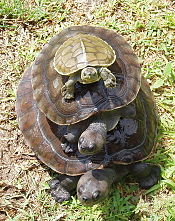
The keeled box turtle is a species of turtle in the family Geoemydidae. The species is endemic to Asia.

The Amboina box turtle or Southeast Asian box turtle is a species of Asian box turtle widely distributed across Southeast Asia. It is native to the Asian mainland from northeast India, through Bangladesh, Burma and Thailand, across Laos, Cambodia, Vietnam, and Malaysia. It is also found on the archipelagos of Indonesia and the Philippines.

The golden coin turtle, also known commonly as the Chinese three-banded box turtle and the Chinese three-striped box turtle, is a species of turtle in the family Geoemydidae. The species is native to southern China. There are two recognized subspecies.

Asian box turtles are turtles of the genus Cuora in the family Geoemydidae. About 12 extant species are recognized. The keeled box turtle is often included in this genus, or separated in the monotypic genus Pyxidea. Genus Cuora is distributed from China to Indonesia and the Philippines, throughout mainland Southeast Asia, and into northern India and Bhutan.
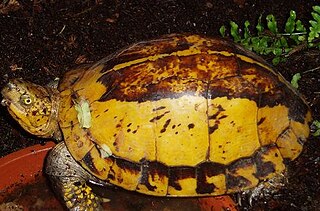
The Indochinese box turtle, Vietnamese box turtle, or flowerback box turtle is a species of Asian box turtles from China, northern and central Vietnam, Laos, and possibly northeastern Cambodia. It is found in high altitude woodland where it tends to hide in the undergrowth. There is considerable confusion as to the taxonomy of this species with several subspecies being recognised by some authorities. and not by others. The International Union for Conservation of Nature has rated its conservation status as "critically endangered".

The Chinese box turtle, also known as the yellow-margined box turtle, or golden-headed turtle, is a species of Asian box turtle. Taxonomically, it is called Cuora flavomarginata.

Mauremys reevesii, commonly known as the Chinese pond turtle, the Chinese three-keeled pond turtle, or Reeves' turtle, is a species of turtle in the family Geoemydidae, a family which was formerly called Bataguridae. The species is native to East Asia.
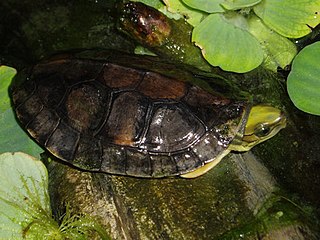
The yellow-headed box turtle or golden-headed box turtle is a proposed species of turtle in the family Geoemydidae. It is sometimes considered a subspecies of Pan's box turtle.

The Yunnan box turtle is a species of turtle in the family Geoemydidae. It is believed to be endemic to Yunnan, China and was suspected to be extinct since the early 20th century; the last verified specimen was collected in 1940.
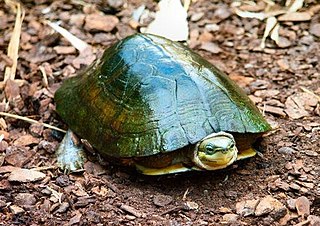
Zhou's box turtle is a species of turtle in the family Geoemydidae. The species is apparently endemic to China.
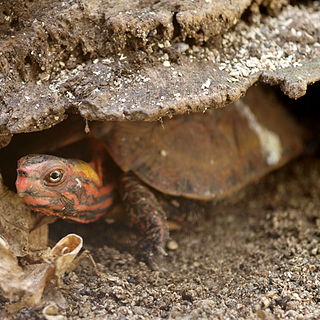
The Ryukyu black-breasted leaf turtle or Ryukyu leaf turtle is a species of turtles in the family Geoemydidae endemic to the Ryukyu Islands in Japan. In 1975, the species was designated a National Natural Monument of Japan. It grows to about 5–6 inches long. In captivity, it feeds on worms, snails, insects, and fruit. Due to its rarity and very attractive appearance, this species is highly coveted by turtle collectors worldwide.
The Fujian pond turtle is a possibly also naturally occurring intergeneric hybrid turtle in the family Geoemydidae produced in larger numbers by Chinese turtle farms as a "copy" of the golden coin turtle Cuora trifasciata. It appears to occur in China and Vietnam. Before its actual origin became known, it was listed as data deficient in the IUCN Red List.
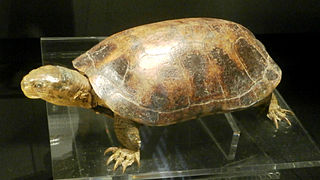
The yellow pond turtle, is a medium-sized, semiaquatic turtle in the family Geoemydidae. This species has a characteristic broad yellow stripe extending behind the eye and down the neck; the carapace ranges in color from grayish brown to brown, and the plastron is yellow or orange with black blotches along the outer edges. It is native to East Asia, ranging from central Vietnam and Laos, north through the coastal provinces of south and central China, with insular populations known from Taiwan, Hainan and the Ryukyu Islands. Although populations in the southern Ryukyus are thought to be native, populations in the northern and central Ryukyus, as well as central Japan, are believed to have been introduced as a result of imports from Taiwan.

The southern Vietnamese box turtle is endemic to the southern mountainous regions of Vietnam, and possibly also occurring in extreme eastern Cambodia and southern Laos. It is known only from Khanh Hoa and southern Phu Yen provinces, but may also occur in eastern Dak Lak and northern Ninh Thuan provinces.
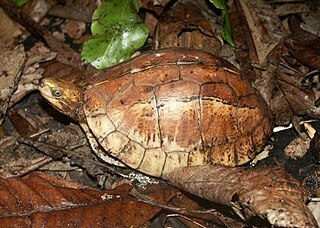
Bourret's box turtle, also known commonly as the central Vietnamese flowerback box turtle and the Indochinese box turtle, is a species of turtle in the family Geoemydidae. The species is endemic to Southeast Asia.

The Vietnamese three-striped box turtle or green rice turtle is a species of the Southeast Asian genus Cuora. It is distributed from the extreme southern part of the Chinese Guangxi province southwards to central Vietnam and central Laos. This species reaches up to 30 cm straight carapace length and is thus the largest Cuora species. Due to demand of traditional Chinese medicine, this species is nearly extinct in the wild, but is readily bred on Chinese turtle farms. Extremely high prices are paid for this species in China. It can be distinguished from Cuora trifasciata by its larger size and generally more oval or rounder shell, which is usually also flatter, a white, pink, or orange chin, and head coloration with an orange-brownish-olive dorsal head pattern and less black pigment.

McCord's box turtle is a species of turtle in the family Geoemydidae. The species is native to China.
John L. Behler was an American naturalist, herpetologist, author, and activist known for his work in conserving endangered species of turtles, snakes, and other reptiles. He served as curator of herpetology at the Bronx Zoo, part of the Wildlife Conservation Society from 1976 to 2006. He co-chaired the IUCN Tortoise and Freshwater Turtle Specialist Group, and was a founding member of the Turtle Survival Alliance, which co-present the Behler Turtle Conservation Award with the Turtle Conservancy and Turtle Conservation Fund. The Behler Turtle Conservation Award is a major annual award to honor leadership in the field of freshwater turtle and tortoise conservation. The Turtle Conservancy named its captive breeding center, the Behler Chelonian Center, in his honor.

Box turtle is the common name for several species of turtle. It may refer to those of the genus Cuora or Pyxidea, which are the Asian box turtles, or more commonly to species of the genus Terrapene, the North American box turtles. They are largely characterized by having a shell shaped like a dome, which is hinged at the bottom, allowing the animal to close its shell tightly to escape predators. Furthermore, the two genera are very different in habitat, behavior and appearance, and are not even classified in the same family. Even though box turtles became very popular pets, their needs in captivity are complex and the capture of turtles can have serious detrimental effects on the wild population.




















